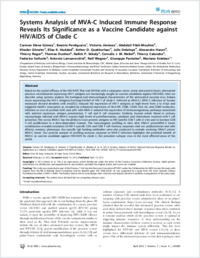Systems analysis of MVA-C induced immune response reveals its significance as a vaccine candidate against HIV/AIDS of clade C
- Gómez, Carmen Elena Department of Molecular and Cellular Biology, Centro Nacional de Biotecnologia, CSIC, Madrid, Spain
- Perdiguero, Beatriz Department of Molecular and Cellular Biology, Centro Nacional de Biotecnologia, CSIC, Madrid, Spain
- Jiménez, Victoria Department of Molecular and Cellular Biology, Centro Nacional de Biotecnologia, CSIC, Madrid, Spain
- Filali-Mouhim, Abdelali Vaccine and Gene Therapy Institute of Florida, Port St. Lucie, Florida, United States of America
- Ghneim, Khader Vaccine and Gene Therapy Institute of Florida, Port St. Lucie, Florida, United States of America
- Haddad, Elias K. Vaccine and Gene Therapy Institute of Florida, Port St. Lucie, Florida, United States of America
- Quakkerlaar, Esther D. Department of Immunohematology and Blood Transfusion, Leiden University Medical Center, Leiden, the Netherlands
- Delaloye, Julie Infectious Diseases Service, Department of Medicine, Centre Hospitalier Universitaire Vaudois, Lausanne, Switzerland - University of Lausanne, Lausanne, Switzerland
- Harari, Alexandre Division of Immunology and Allergy, Centre Hospitalier Universitaire Vaudois, Lausanne, Switzerland
- Roger, Thierry Infectious Diseases Service, Department of Medicine, Centre Hospitalier Universitaire Vaudois, Lausanne, Switzerland - University of Lausanne, Lausanne, Switzerland
- Dunhen, Thomas Institute for Research in Biomedicine (IRB), Faculty of Biomedical Sciences, Università della Svizzera italiana, Switzerland
- Sékaly, Rafick P. Vaccine and Gene Therapy Institute of Florida, Port St. Lucie, Florida, United States of America
- Melief, Cornelis J. M. Department of Immunohematology and Blood Transfusion, Leiden University Medical Center, Leiden, the Netherlands
- Calandra, Thierry Infectious Diseases Service, Department of Medicine, Centre Hospitalier Universitaire Vaudois, Lausanne, Switzerland -University of Lausanne, Lausanne, Switzerland
- Sallusto, Federica Institute for Research in Biomedicine (IRB), Faculty of Biomedical Sciences, Università della Svizzera italiana, Switzerland
- Lanzavecchia, Antonio Institute for Research in Biomedicine (IRB), Faculty of Biomedical Sciences, Università della Svizzera italiana, Switzerland
- Wagner, Ralf University of Regensburg, Regensburg, Germany
- Pantaleo, Giuseppe Division of Immunology and Allergy, Centre Hospitalier Universitaire Vaudois, Lausanne, Switzerland
- Esteban, Mariano Department of Molecular and Cellular Biology, Centro Nacional de Biotecnologia, CSIC, Madrid, Spain
-
19.04.2012
Published in:
- Plos one. - 2012, vol. 7, no. 4, p. e35485
English
Based on the partial efficacy of the HIV/AIDS Thai trial (RV144) with a canarypox vector prime and protein boost, attenuated poxvirus recombinants expressing HIV-1 antigens are increasingly sought as vaccine candidates against HIV/AIDS. Here we describe using systems analysis the biological and immunological characteristics of the attenuated vaccinia virus Ankara strain expressing the HIV-1 antigens Env/Gag-Pol-Nef of HIV-1 of clade C (referred as MVA-C). MVA-C infection of human monocyte derived dendritic cells (moDCs) induced the expression of HIV-1 antigens at high levels from 2 to 8 hpi and triggered moDCs maturation as revealed by enhanced expression of HLA-DR, CD86, CD40, HLA-A2, and CD80 molecules. Infection ex vivo of purified mDC and pDC with MVA-C induced the expression of immunoregulatory pathways associated with antiviral responses, antigen presentation, T cell and B cell responses. Similarly, human whole blood or primary macrophages infected with MVA-C express high levels of proinflammatory cytokines and chemokines involved with T cell activation. The vector MVA-C has the ability to cross-present antigens to HIV-specific CD8 T cells in vitro and to increase CD8 T cell proliferation in a dose-dependent manner. The immunogenic profiling in mice after DNA-C prime/MVA-C boost combination revealed activation of HIV-1-specific CD4 and CD8 T cell memory responses that are polyfunctional and with effector memory phenotype. Env-specific IgG binding antibodies were also produced in animals receiving DNA-C prime/MVA-C boost. Our systems analysis of profiling immune response to MVA-C infection highlights the potential benefit of MVA-C as vaccine candidate against HIV/AIDS for clade C, the prevalent subtype virus in the most affected areas of the world.
- Language
-
- English
- Classification
- Medicine
- License
- Open access status
- gold
- Identifiers
-
- RERO DOC 326687
- DOI 10.1371/journal.pone.0035485
- ARK ark:/12658/srd1319096
- Persistent URL
- https://n2t.net/ark:/12658/srd1319096
Statistics
Document views: 176
File downloads:
- Texte intégral: 161
